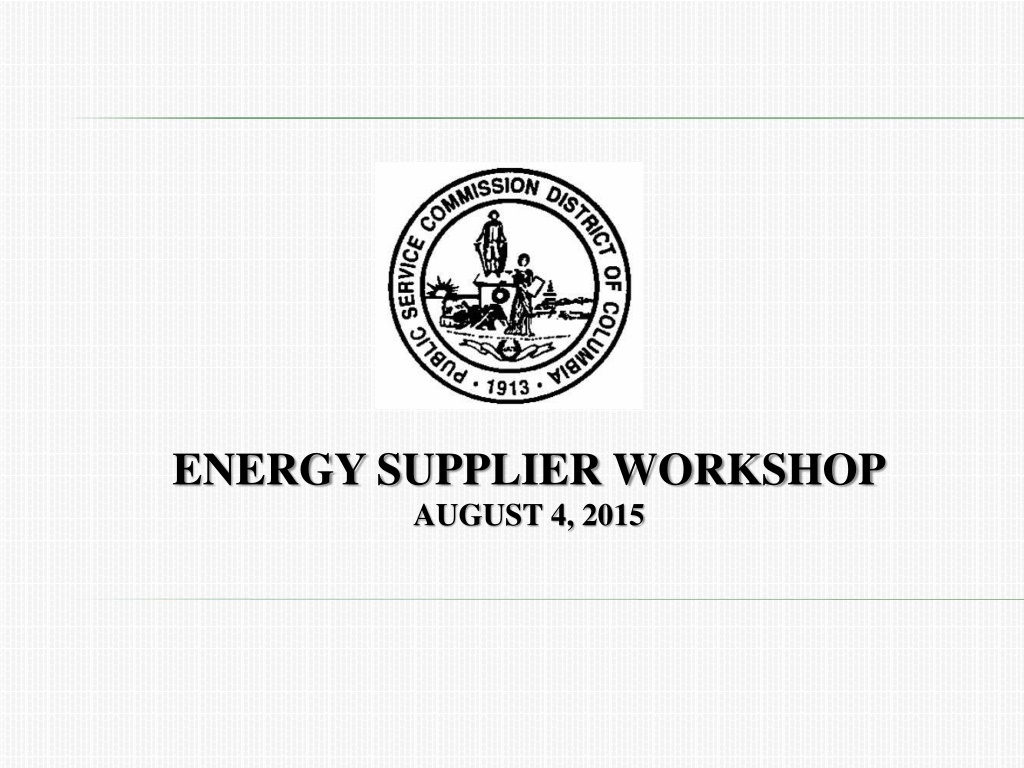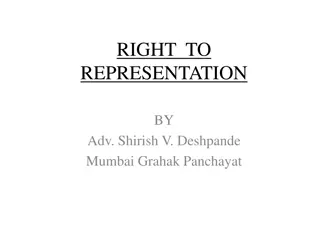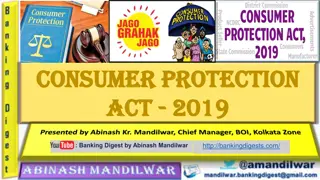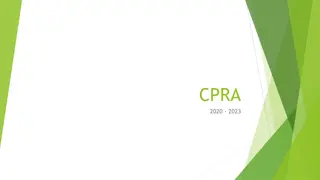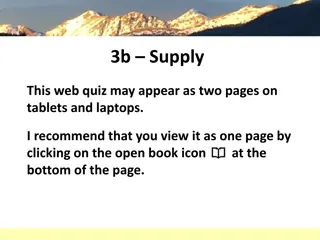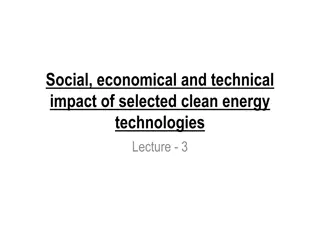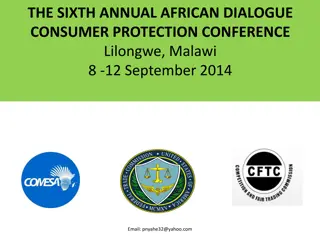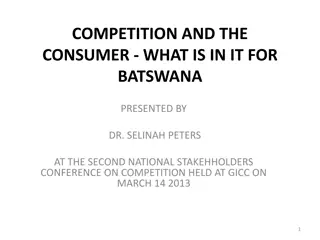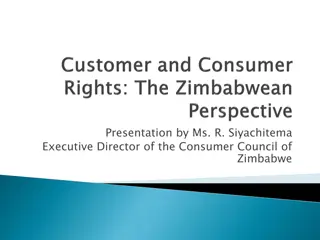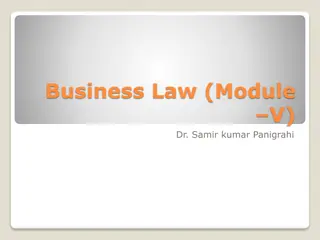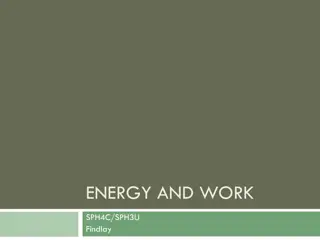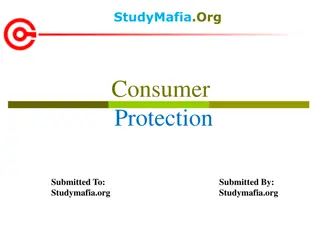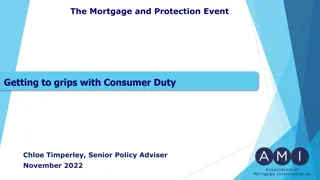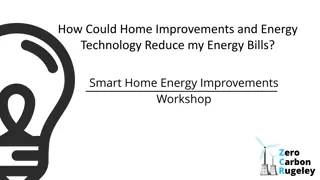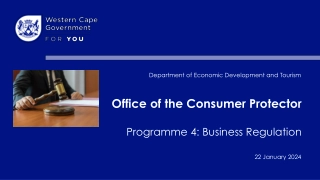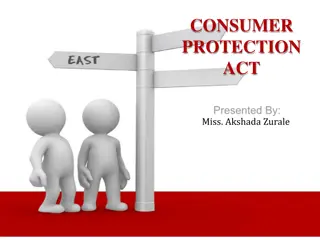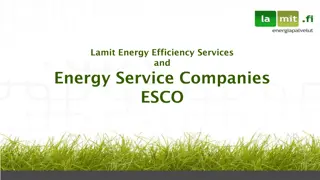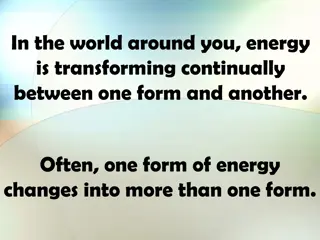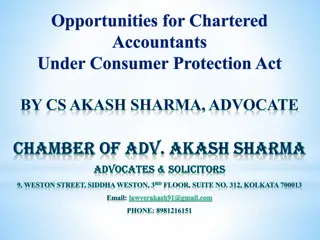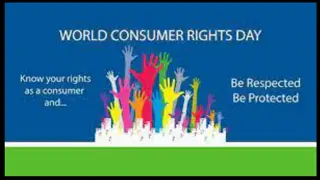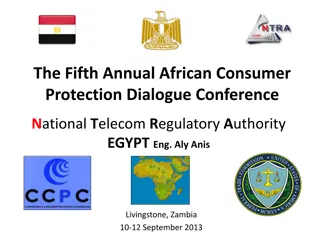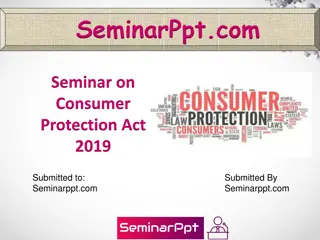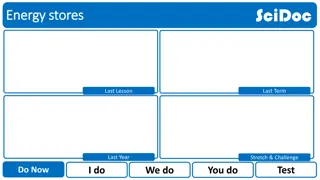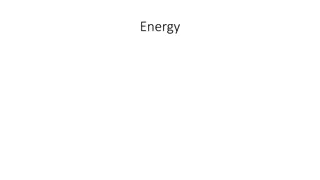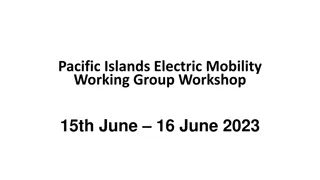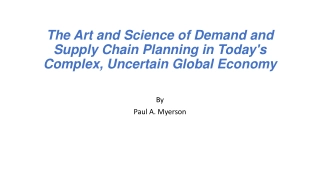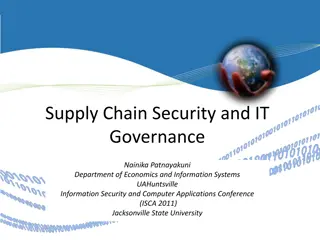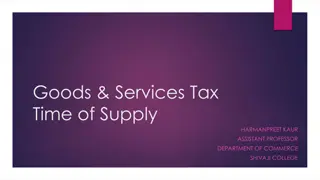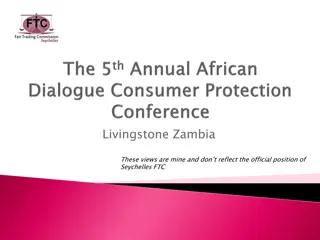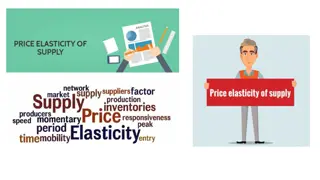Consumer Rights and Responsibilities in Energy Supply Workshop
The Consumer Bill of Rights (CBOR) outlines rules for energy suppliers and utilities in the District of Columbia. It covers aspects like meter readings, billing, deposits, disconnections, and complaint resolutions. Energy suppliers must clearly identify bill components and may require deposits from customers. The CBOR aims to protect consumers and promote fair practices in the energy sector.
Download Presentation

Please find below an Image/Link to download the presentation.
The content on the website is provided AS IS for your information and personal use only. It may not be sold, licensed, or shared on other websites without obtaining consent from the author. Download presentation by click this link. If you encounter any issues during the download, it is possible that the publisher has removed the file from their server.
E N D
Presentation Transcript
ENERGY SUPPLIER WORKSHOP AUGUST 4, 2015
THE CONSUMER BILL OF RIGHTS (CBOR) ENERGY SUPPLIER WORKSHOP INTRODUCTION Chapter 3 of Title 15 of District of Columbia Municipal Regulations ( DCMR ); Originally enacted in 1979, when it covered only three utility companies one electric, natural gas, and telephone. With the emergence of competition in those three utility sectors, the Commission began deliberations, through Working Groups and NOPRs, in 2005 to upgrade and expand the CBOR to meet and adapt to a marketplace. changing, competitive utility In 2008, the Commission acknowledged the change in how utility services are provided to residential customers in the District of Columbia because of competition and the consumers ability to purchase their energy supply from service providers. This changing environment caused the Commission to adopt regulations which promote administrative efficiency, and uniformity in the treatment of Utilities and service providers. awareness and understanding of their rights and responsibilities regarding natural gas, electric, and telephone services in the District of Columbia. As a result, a new Consumer Bill of Rights became effective in September, 2009. In addition, the rules would increase the public s 2
The CBOR sets forth a residentialconsumers rights and responsibilities, and rules for the initiation and acquisition of services, such as but not limited to: Meter Reading Billing Payments Use of Customer Information Deposits Disconnections and Reconnections of Service and the Resolution of Complaints Consumer Protection Standards applicable to Energy Suppliers Informal and Formal Complaints. The Utilities are responsible for regular monthly meter readings and shall also provide the customer with means to report meter readings. 301-303. (XR 327.49-Suppliers do not conduct meter readings) Customers should be provided with an actual or estimated bill during each billing cycle and the bill should provide the service the customer elected. 303-304. (XR 327.50) The Utilities or Energy Suppliers may provide for a level payment billing program, budget payment plan or Deferred Payment Agreements (DPA). 304.10 and 306.1. (XR 327.51 thru 327.53- Energy Suppliers may periodically analyze plans for actual usage variances). 3
An Energy Supplier can elect to bill customers (separate or consolidated billing), but the bill must clearly identify each service and bill components. 304.14 -304.15. When the Utility renders a bill for an Energy Supplier, there is a hierarchy for payment: first to the applicable Utility for arrears for Commission regulated Charges, oldest item first; next to arrears for non-regulated Charges (i.e., Energy Supplier Charges for gas supply or electricity); next to the Utility for current Commission-regulated Charges; finally, to current non- regulated Charges. 305.1-305.4 An Energy Supplier may require a deposit or guarantee of payment from a customer if authorized by its license. 307.14- 307.15. 4
CONSUMER PAMPHLETS AND PUBLIC ACCESS TO RATES The Energy Suppliers shall each, individually prepare a pamphlet in English and Spanish in layman s terms summarizing the rights and responsibilities of Customers in accordance with rules 321.1 through 321.6. The text of each pamphlet is subject to prior Commission approval and pre-publication comment of the Office of the People s Counsel. (XR 321.1-OPC 5 days to comment PSC 30 days to decide or deemed approved) Energy Suppliers shall keep available for free public inspection copies of rates, and the supplier s terms and conditions of service. 322.1. (XR 327.48- Post information on website) Energy Suppliers shall have available translation services during normal business hours for the translation of its Tariff terms and conditions of service into Spanish and shall post a notice in each office stating that the rates and regulations are available for review at no cost to the Customer. 322.2-322.3. 5
Office of Consumer Services (OCS) 6
OFFICE OF CONSUMER SERVICES CORE FUNCTION CONSUMER COMPLAINTS INFORMAL COMPLAINT PROCESS Section 320 Applies to Suppliers as well as Utilities If It Can t be Resolved by Utility/Supplier and the Customer File a Complaint with the PSC/OCS 14-Business Day Response Resolution; or Informal Hearing Mediation Resolution; or Formal Complaint 7
NATURE AND TYPE OF SUPPLIER COMPLAINTS RECEIVED BY OCS Slamming Deceptive Marketing Variable Rates Telephone Solicitations Renewal Notifications Cancellation Requests 8
ELECTRIC INDUSTRY COMPLAINTS RECEIVED BY OCS FISCAL YEARS 2013 2015 FY 2013 FY 2014 FY 2015 (through 3Q) Electric Industry 979 823 555 Electric Suppliers 581 428 167 __________________________________________________________________________________________________ Percentage 60 52 30 Electric Suppliers account for approximately 14% of the residential customers in the District 9
FORMAL COMPLAINTS (324 and 325) Formal Complaints are processed by the Office of the General Counsel. Consumers are required to put Formal Complaints in writing, stating facts necessary to state a claim upon which relief may be granted and the specific relief requested. Complaints are to be filed with the Office of the Commission Secretary (OCMS). Within 2 Business Days of Complaint s filing, OCMS is to notify the affected Energy Supplier (Contact info should be on file) and provide the supplier with a copy of filing. The Energy Supplier is required to file a written answer OCMS within 14 Days and serve the answer on the Customer/Representative/legal counsel. 10
FORMAL HEARING PROCEDURES ( 325.1-325.19) Section 325 contains the formal hearing process which is available to consumers who receive their energy needs from Energy Suppliers. If this section is silent on an issue, the Hearing Officer has the discretion to use Chapter 1 regulations as appropriate. The formal rules of evidence shall not apply, but the hearing officer shall exclude irrelevant or unduly repetitious evidence. All proceedings shall be recorded or transcribed by a certified court reporter. When a formal hearing is requested, a hearing officer is designated, and the matter is scheduled within forty-five (45) days of the filing of the Answer At least 14 days prior to the hearing date, notice of the hearing is served via first-class mail and the notice informs the parties that if they fail to attend a scheduled hearing without evidence of good cause, the hearing officer, among other things, may dismiss the Complaint with prejudice or hear evidence and render a decision. Parties can request a continuance. However, a Party requesting a second continuance will be required to provide good cause for the continuance. Parties are to provide witnesses and documents/information/data as requested. However, information deemed to be confidential may be reviewed in a manner that is consistent with the Commission s Rules of Practice and Procedure. Parties may be represented or pro se and the Hearing Officer may construe the pleadings liberally, limit lines of questioning, direct the order of testimony and elicit testimony; the parties may present evidence, call witnesses under oath, cross examine, present arguments 11
DECISION AND APPEALS ( 326) The Hearing Officer s decision should issue within 30 days after the close of the record. The remedies available to the Hearing Officer are: refunds, credits, installment payments, and other equitable or injunctive relief BUT not compensatory or punitive damages. If the sole basis for relief is compensatory/punitive damages the Complaint may be dismissed with prejudice by the Hearing Officer for failure to state a claim upon which relief may be granted. The Hearing Officer s decision will note how a party can appeal and indicate the last date the appeal may be filed. The Hearing Officer s decision is final if there is no appeal to the Commission within 30 days. However, if appealed, the appeal should identify the decision appealed and specify the grounds for appeal. The opposing Party has 7 to 10 days to respond. The Commission shall issue an Order on Appeal within 30 days of certification of the record and the Order will either adopt, remand, state the Commissions own decision, or other action deemed appropriate. However, if the Commission does not render a decision within thirty 30 days, then the Hearing Officer s decision becomes the final decision of the Commission, unless tolled. Parties have 30 days from the issuance of a decision to request reconsideration of the Order on Appeal. The filing of such request acts as a stay of the order until the Commission takes final action. Review of a final Commission decision shall be to the District of Columbia Court of Appeals pursuant to D.C. Code 34-604 and 34-605 (2001). 12
ENERGY SUPPLIER WORKSHOP ENERGY SUPPLIER CUSTOMER PROTECTION STANDARDS ( 327) This section provides the billing, Deposit, Enrollment, Termination of Contract, supplier switching, advertising and minimum Contract standards that apply to Energy Suppliers. Alleged violations of this section are generally addressed through the Complaint procedures in 320 and the Energy Supplier has the burden of proving the existence of a contract ( 327.24). Violations of this section may subject an Energy Supplier to Sanctions including license revocation ( 327.54). No unlawful, misleading or deceptive marketing, advertising, Solicitation or trade practices such as Cramming or Slamming and abide by Do Not Contact requests. 327.2-327.4 and 327.12-327.13. Prohibition against disclosing Account status and Customer information. Solicitations must contain pertinent information about the supplier, the license number, the price, the time period offer is open, the duration of contract, any disclaimers and that it does not include taxes, fees and other charges. 327.7. 13
Supply Contracts with Customers shall contain, among other things, the following material terms and conditions ( 327.8): A list and description of the Contract services Minimum use requirements Description of any time of use restrictions Price description of each service, including all fixed and variable costs Notice that the Contract does not include Utility Charges Billing procedure description Dispute resolution procedures PSC and OPC information. 14
Telephone and Home Solicitations are limited between 9 a.m. and 9 p.m/sunset and the Energy Suppliers are required to have a standardized phone script that provides the Solicitor s name, the name of the business calling, the nature of the call, a brief description, an offer to the Customer to hear the full Solicitation, and note the Buyers right to cancel. 327.9-327.11. Negative Option Contracts are prohibited. 327.15. The current rules provide for 3 means of Contracting ( 327.14) and the new rules provide for 4 ( 327.14): Telephone (Telephone Solicitation) Internet and other technological means (Internet Solicitation) Written contract (Home/Other Personal Solicitation) (Direct Mail Solicitation) There are limitations on the information suppliers can request from customers; a supplier must inform the Customer of his or her right not to provide additional information. 327.16-327.17. 15
Notice of 3 day rescission period. The 3-Day Rescission Period begins either when contract signed, when electronic acceptance transmitted, or when the Contract is mailed and postmarked. 327.18 and 327.44 (New 327.18 clarifies that the rescission period begins when Contract is signed) Enrollment transactions can be transmitted within 5 business days of providing a complete written/electronic Contract provided the Supplier obtains a written signature, an electronic signature (24 hours to acknowledge receipt) or a positive verification from an Independent TPV/electronic recording. A Supplier must ask certain questions and maintain the entire recording for the duration of the Contract. 327.20-327.23, 327.25, 327.8 327.9, and 327.39-327.40. Solicitations may be posted on the Suppliers website and the 3 day contract rescission period must be prominently displayed on the website. 327.26 and 327.49 A secure website is necessary for electronic contracting and the website must prompt Customer to print or save the Contract, must clearly display a Cancel icon, and must provide a secure location on its website where the Customer can verify enrollment. 327.31-327.34. 16
Once the rescission period is passed and the Utility has accepted an Enrollment from an Energy Supplier, the Utility shall not accept Enrollments from any other Energy Supplier for that Customer until Termination or Cancellation of Contract. 327.37-327.42. After expiration of rescission period, the relationship between the Customer and the Supplier is governed by the terms of the contract. 327.43. Energy Suppliers shall provide Customers with a notice at least thirty-five (35) Days before expiration or termination of a Contract. 327.45. The Energy Supplier shall provide 45 days notice before Contract renewal is scheduled and set forth any changes in material terms and how to terminate the Contract. 327.46. Suppliers must provide at least 24 hours notice prior to any changes in its rates charges and services provided. 327.47 Violation of the rules in this section will subject an Energy Supplier to potential enforcement action. 327.54 17
ELECTRICT SUPPLIERS LICENSING AND BONDING CHAPTER 46 - LICENSURE OF ELECTRICITY SUPPLIERS Currently, the requirements for licensing Electricity Suppliers are set forth in Formal Case No. 945, Order No. 11796, rel. September 18, 2000. Bonding requirements for Electric Suppliers are set forth in Formal Case No. 945, Order No. 11862, rel. December 18, 2000. Chapter 46 is a new chapter which establishes rules governing the licensure and bonding of Electricity Suppliers in the District of Columbia, pursuant to the Retail Electric Competition and Consumer Protection Act of 1999 ( 1999 Act ) as codified in Sections 34-1501 through 1520 of the D.C. Code. This Rulemaking proposes to put the licensing and bonding requirements in a single chapter. 4601 Definitions (b) 1-33. Under this Section, the Commission defines such terms as Electric Company, Electric Supplier, Electric Supplier license, Regional Transmission and Small Commercial Customers. The Commission will address party comments regarding the definition of Electric Company and Electric Supplier in the technical conference. 4602 Licensing Requirements. An application for an Electricity Supplier License shall include information such as proof of technical and managerial competence, a sworn verification that the Applicant is currently in compliance with, and will comply with all, applicable federal and District of Columbia environmental laws and regulations, proof of compliance with the Bonding Requirements set forth in 4605 &4606 and a sworn verification that the Applicant is currently in compliance with, and will comply with all of the requirements of the Act and all orders and regulations of the Commission issued under the Act (See Section 4602.2). 4603 Licensing Procedures. Each Applicant must file a signed and verified original and 14 copies and electronic version of their application and attachments and the Applicant shall immediately inform the Commission of any change in the information provided in the Application during the pendency of theApplication process. See Sections 4603.3 and 4603.4. 18
4603.5 Notice of Application and Notice of Incomplete Application (Deficiency Letter). The Commission shall review the submitted Application for completeness within fifteen (15) days of receipt of the Application and inform the Applicant if the Application is either complete or incomplete. If the Application is complete, the Commission shall notify the Applicant in writing that the Application is complete and has been accepted for filing and the Commission shall post the Notice of Application in the D.C. Register. If the Application is incomplete, the Commission shall notify the Applicant in writing of the deficiencies in the Application. The Applicant shall have ten (10) days, or such additional time as the Commission may designate if it extends the time period for good cause shown to provide the information requested in the deficiency letter. If the Applicant does not provide the information to the Commission within ten (10) days or within the alternative time period set by the Commission, the Application shall be deemed dismissed without prejudice. Once the deficiency has been cured by the Applicant, the Commission will notify the Applicant in writing that the Application is now complete and has been accepted for filing and the Commission shall post the Notice of Application in the D.C. Register. 4603.6 Comments and Objections Regarding Filed Application. A Comment or objection must be submittedto the Commission Secretary and to the Applicant no later than thirty (30) days after the Notice of Application has been published in the D.C. Register. An Applicant may file reply comments no later than seven (7) days after objections or comments are filed with the Commission Secretary. 4603.7 Review of Complete Application. Within fifteen (15) days after the comment period has expired, the Commission shall conclude its investigation and issue a Licensing Order approving or denying the Application if no objections or comments are filed. If an objection to licensure or comments are filed, the Commission shall conclude its investigation and issue a Licensing Order approving or denying the Application within sixty (60) days after the comments or objection period has expired. 19
4603.8 Licensees Update Information 4603.9 Term of Electricity SupplierLicense. An Electricity Supplier License is valid until revoked by the Commission or surrendered by the licensed Electricity Supplier. 4603.10 Transfer of Electricity Supplier License. An Electricity Supplier License is not transferable without the prior approval of the Commission. To obtain the approval of the Commission, a Licensee must file a Transfer Application with the Commission Secretary. All Persons interested in filing an objection or a comment regarding the filed Application may submit written comments or objections to the Commission s Secretary no later than thirty (30) days after the posting of the Notice of Application on the Commission s website. The Licensee may file reply comments no later than seven (7) days after objections or comments are filed. Within thirty (30) days after the comment period has expired, the Commission shall issue an order approving or denying the Transfer Application if no objections or comments are filed. If an objection to a Transfer Application or a comment is filed, the Commission shall conclude its investigation and issue an order approving or denying the Transfer Application within sixty (60) days after the comments or objection period has expired. *4603.11 Solicitation of Customers. ALicensee (both new and existing, if not currently serving customers) is required to notify the Commission no later than ten (10) days before it starts soliciting customers directly or through an authorized representative. The notice shall include the name of the Electricity Supplier s designated contact person for pricing information if the Licensee is serving residential customers and small commercial customers and the URL address of the Electricity Supplier s website. The Licensee shall provide photo identifications for each person who conducts in person Solicitations for the Licensee. The Licensee shall also provide the Commission with a copy of its flyers, consumer pamphlets, scripts and other proposed marketing material at the time of notification. 20
*4603.12 Electronic Solicitation. For the purpose of monitoring compliance with 15 DCMR Sections 327.26, 327.27, 327.30, 327.31, 327.32, 327.33, 327.34 and 327.48 regarding electronic solicitation on the Licensee s website, each Licensee who contracts electronically with customers shall provide the Commission with the electronic capability to initiate and complete its website enrollment process, without creating an actual customer account. Each Licensee shall demonstrate this capability by providing the Commission with a dedicated (simulated) account number for its use to test and monitor the Licensee s website. *4603.13 Serving Customers. A Licensee is required to do the following before it begins to serve customers in the District of Columbia: (a) notify the Commission of the date when it will begin to serve customers in the District of Columbia; and (b) file an affidavit attesting that all sales and marketing and regulatory personnel have been trained in Chapters 3 and 46 of Title 15 of the D.C.M.R. before they begin soliciting customers in the District of Columbia. 4603.14 Cessation of Business in the District of Columbia or Cessation of Business to a Customer Class. A Licensee shall provide to the Commission at least sixty (60) days prior written notice of the Licensee's intention to cease providing services (a) in the District of Columbia; or (b) to all Customers within a specified Customer class. 4603.15 Electric Company and Licensee Responsibilities in the Event of Default 4603.16 Required Notices Upon Default. Upon default, a Licensee must immediately send written notice to its customers notifying them of its default and send written notice to the Electric Company and Commission notifying them of its default. Upon receipt of notice of a Licensee default from the Licensee or from the Regional Transmission Organization, the Electric Company must immediately provide the defaulting Licensee s customers Standard Offer Service in accordance with the SOS Administrator s Retail Electric Service Tariff, unless the customers select a new Electricity Supplier. 21
4604 Electricity Supplier Education Workshop 4604.1 Electricity Supplier Education Workshop. Within one year of licensing or within one year of the adoption of this rule, whichever is later, each Licensee s Regulatory Contact or Licensee s representative responsible for the Licensee s compliance with the Commission s rules shall complete the Electricity Supplier Education Workshop sponsored by the Commission. Successful completion of the workshop by the Licensee shall be evidenced by a certificate awarded by the Commission. 4605 Bond Requirements For Electricity Suppliers Collecting Deposits or Prepayments ( Customer Payments Bond ) and; 4606 provides the Bond Requirements for Financial Integrity ( Integrity Bond ) 4607 Privacy Protection Policy *4607.1 All Applicants and current Licensees must submit to the Commission Secretary a copy of the company s Privacy Protection Policy that demonstrates compliance with 15 D.C.M.R. 308 (Use of Customer Information) and 15 D.C.M.R. 309 (Privacy Protection Policy) within ninety (90) days of the adoption of this rule, or within sixty (60) days of receiving their Electricity Supplier License, whichever date is later. 22
4608 Commission Reporting Requirements *4608.1 Updates to an Approved Application. Commission of new information that changes or updates any part of the Application, including but not limited to the averment regarding any civil, criminal, or regulatory penalties imposed on the Licensee, within thirty (30) days of the change or the new information. An Applicant or a Licensee must also inform the Commission of changes to the averment regarding bankruptcy proceedings instituted voluntarily or involuntarily within twenty-four (24) hours of the institution of such proceedings. After an Application has been approved, a Licensee must inform the If a Licensee changes any of its marketing materials, it shall provide the new materials to the Commission no later than ten (10) days before it starts using the new material to solicit Customers; and If a Licensee changes its trade name or the d/b/a name that it is using in the District of Columbia, the Licensee shall notify the Commission within ten (10) days and prior to soliciting Customers under that new name. *4608.2 Annual Reporting Requirements. The Licensee shall annually review its Application and submit updated information as needed. Annual updates must be filed with the Commission within 120 days after the anniversary of the grant of the License. The Licensee shall, if it is serving residential customers and small commercial customers, also submit the name of its regulatory contact, website address, the contact for pricing information, copies of its flyers, scripts, pamphlets and other marketing materials. The Licensee shall recertify annually that it has complied with Section 4603.12 (b) of this Chapter. A Licensee shall provide any information required by any other Commission order or regulation. The Licensee shall also provide annually a copy of its Privacy Protection Policy to the Commission. 23
4609 Commission Action Regarding a Licensee 4609.1 Commission Investigation. The Commission may initiate an investigation of a Licensee upon its own motion or upon the complaint of the Office of the People s Counsel, the Office of the Attorney General, or any aggrieved party. *4609.2 Grounds for Commission Action. The Commission may take action regarding a Licensee for just cause as determined by the Commission. Justcause includes, but is not limited to, slamming, failing to provide adequate and accurate information to each Customer about the Licensee s available services and charges, failing to post on the Internet information that is readily understandable about its services and rates for Small Commercial Customers and Residential Customers, failing to provide electricity for its Customers, conviction by the Licensee or principal of the Licensee (including the general partners, corporate officers or directors, or limited liability managers or officers of the Licensee) of any felony and failing to notify the Commission no later than ten (10) days before it begins soliciting Customers and thirty (30) days after it begins serving Customers, per section 4603.11 and 4603.12, respectively. See Section 4609.2 A-W. 4610 Sanction and Enforcement 4610.1 Sanctions. Electricity Suppliers and Licensees are subject to sanctions for violations of the District of Columbia Code, and applicable Commission regulations and orders. The sanctions may include a $10,000 civil penalty, customer Refund or credit, Cease and Desist Order Cancellation of a contract or part of a contract between a Customer and a Licensee or an Electricity Supplier, Suspension of a Licensee s License, and Revocation of a Licensee s License. See Sections 4610.1 A-F. 24
4610.3 Emergency Action by the Commission. The Commission may temporarily suspend a License, issue a temporary cease and desist order, or take any other appropriate temporary remedial action, pending a final determination after notice and hearing, if the Commission determines that there is reasonable cause to believe that Customers or the reliability of electric supply in the District of Columbia is or will be harmed by the actions of a Licensee or an Electricity Supplier. 4611 Commission Assessment and Fees 4611.1 The Licensee or the Electricity Supplier shall pay an assessment for the costs and expenses of the Commission and the Office of the People's Counsel as required by Title 34 of the District of Columbia Code. 4611.2 The Licensee or the Electricity Supplier shall pay any additional fees imposed by the Commission pursuant to the Commission s rules, regulations, or orders. 25
